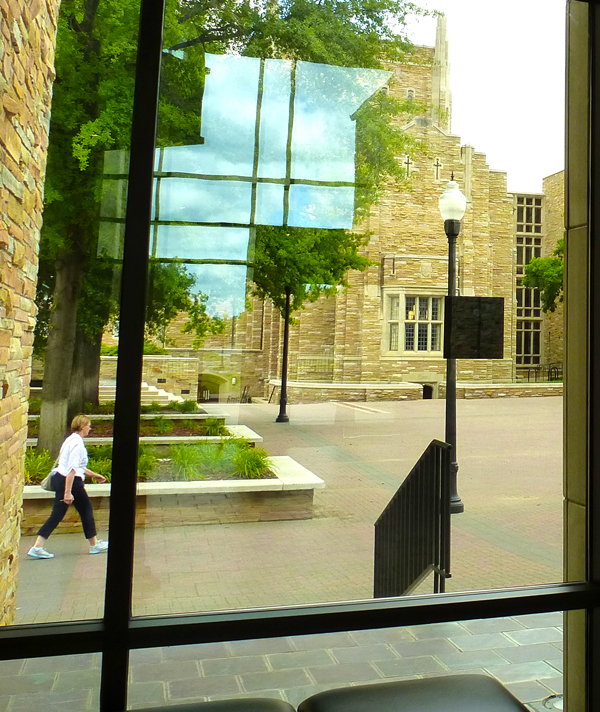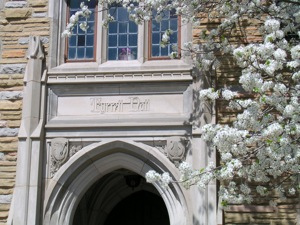Edward Dumit, University of Tulsa Associate Professor Emeritus of Communication, earned his Bachelor and Master degrees in Speech at the University of Tulsa and completed additional graduate courses in Criticism at Northwestern University and the University of Oklahoma. He served the  University of Tulsa for thirty-eight years as instructor of broadcasting courses and, at various times, public radio station KWGS manager, program director, and arts producer. Following his retirement in 1993, he continued until 2001 as producer and host of concert broadcasts of the Tulsa Philharmonic Orchestra and OK Mozart International Festival. For twenty-five years, Dumit presented preview lectures for every major Tulsa Opera production from 1970 to 1995 and hosted a preview feature preceding each Tulsa Philharmonic Masterworks concert from 1992 to 2001.
University of Tulsa for thirty-eight years as instructor of broadcasting courses and, at various times, public radio station KWGS manager, program director, and arts producer. Following his retirement in 1993, he continued until 2001 as producer and host of concert broadcasts of the Tulsa Philharmonic Orchestra and OK Mozart International Festival. For twenty-five years, Dumit presented preview lectures for every major Tulsa Opera production from 1970 to 1995 and hosted a preview feature preceding each Tulsa Philharmonic Masterworks concert from 1992 to 2001.
A Tulsa native, Mr. Dumit has been seen in numerous dramatic and comic acting and singing performances with Theater Tulsa, the University of Tulsa Theater, and the Gilbert and Sullivan Society (now Light Opera of Oklahoma), and has been narrator with the Tulsa Philharmonic, Tulsa Symphony orchestra, and Tulsa Oratorio Chorus.
Mr. Dumit co-authored with Dr. Ben Graf Henneke the standard broadcast text, The Announcer's Handbook, and was pronouncer of classical music names and titles for the 1959 vinyl LP, Say It Right! The Ave Maria Press of Notre Dame published his audio cassette of An Angel in My House by Tobias Palmer (pseudonym of Winston Weathers).
For over two decades until 2000, he coached each Miss Oklahoma—including Miss America 1996, Shawntel Smith—in voice and diction and interview technique. He is still heard twenty-four hours a day articulating station identifications on TU Public Radio's KWGS and KWTU.
Among his awards are the Oklahoma Governor's Arts Award, the Harwelden-Kathleen P. Westby Lifetime Award for Outstanding Contribution to the Arts, and Toastmasters Communication and Leadership Award. In 2004 he was named by the Tulsa Press Club as a Tulsa Radio Icon and was inducted into the TU Communication Hall of Fame in 2009.
Edward Dumit it is a member of Alpha Epsilon Rho (radio), Theta Alpha Phi (theater), Phi Gamma Kappa (scholarly). He is also an honorary member of Sigma Alpha Iota as a "Friend of the Arts."
Robert L. Canfield graduated from TU in 1952 with a B.A. in Psychology and he earned an M.A. in Linguistics and a Ph.D. in Anthropology from the University of Michigan. One of our preeminent scholars on Afghanistan and Central Asia, Dr. Canfield is Professor of Sociocultural Anthropology at Washington University in Saint Louis. Among his ongoing interests as a cultural anthropologist is to report on situations and social practices among the people whom he knew in Afghanistan when he collected field notes there in the 1960s. Two recently published memoirs based on that material are "Recollections of a Wedding in the 1930s" and "Trouble in Birgilich".
 Dr. Canfield is also doing work on explaining the wider significance and geopolitical implications of the Afghanistan war, as in such recent publications as Continuing Issues in the New Central Asia (2008), and his essay in Ethnicity, Authority, and Power in Central Asia: New Games Great and Small (2010). Another area of his work is studying and describing patterns of alliance that have taken form among the fighting groups in Central Asia during the last several decades. The most recent of those studies are "Fraternity, Power, and Time in Central Asia" (on the groups that joined the Taliban in the 1990s), and "New Trends among the Hazaras: From 'The Amity of Wolves' to 'The Practice of Brotherhood.'"
Dr. Canfield is also doing work on explaining the wider significance and geopolitical implications of the Afghanistan war, as in such recent publications as Continuing Issues in the New Central Asia (2008), and his essay in Ethnicity, Authority, and Power in Central Asia: New Games Great and Small (2010). Another area of his work is studying and describing patterns of alliance that have taken form among the fighting groups in Central Asia during the last several decades. The most recent of those studies are "Fraternity, Power, and Time in Central Asia" (on the groups that joined the Taliban in the 1990s), and "New Trends among the Hazaras: From 'The Amity of Wolves' to 'The Practice of Brotherhood.'"
In describing his research interests, Dr. Canfield writes that his "research interests are not disparate for, in the grand tradition of the discipline, I take anthropology to be the science of history. As such it encompasses the need to understand the human condition as we find it in many social contexts, from the every day encounters of ordinary people to the political activities of leaders involved in world affairs. For me, this is the funnest field there is."
In addition to a life full of scholarship and teaching, Canfield has served as a consultant for both government and journalistic ventures. In 1988 he advised USIS (United States Information Service) on the establishment of a Center for the Study of Government among the Afghan refugees in Pakistan; and in 1990 he worked with AID (Agency for International Development) to develop a strategy for the encouragement of democratic institutions among the Afghanistan peoples. He has also advised National Geographic on various projects. Among many other scholarly honors, Canfield has received a fellowship from the National Endowment for the Humanities and served as a Fulbright Scholar in Pakistan.